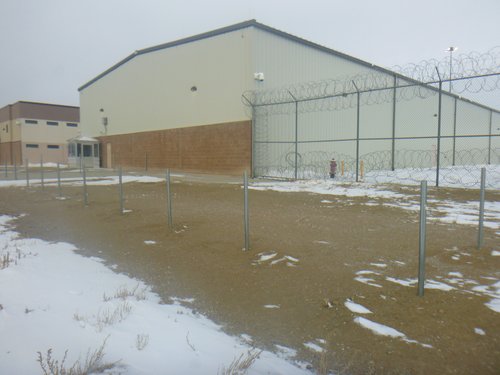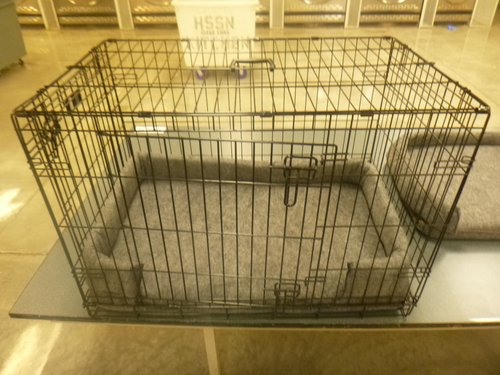Wyoming State Penitentiary Launching New Dog Training Initiative
Program will make dogs from local shelter suitable for adoption
- Published In: Other News & Features
- Last Updated: Dec 27, 2022

Pictured above are participants in a canine training program at the Wyoming Medium Correctional Institution in Torrington. Some dogs are trained for adoption, while others are trained for service. (Courtesy photo from the Wyoming Department of Corrections)
By Shen Wu Tan
Special to the Wyoming Truth
Man’s best friend is about to make some new pals at the Wyoming State Penitentiary.
A new canine program that will train dogs from a local animal shelter and prepare them for adoption will launch at the prison in Rawlins in January.
To start, the program will include six inmates and three dogs from the Rawlins-Rochelle Animal Shelter. Each dog will be assigned a canine handler and a canine sitter, according to Seth Norris, the deputy warden at Wyoming State Penitentiary (WSP) who is overseeing the program.

“I’m a huge advocate of canine therapy,” Norris said. “I’m a huge advocate of what I’ve seen from what canines can do for the inmates and for the staff. It’s a major boost of morale for inmates and staff alike. It teaches them responsibility. It teaches them the ability to be loved unconditionally and return that as well. I’ve seen the transformation that it causes, and I also wanted some type of community service to benefit the town of Rawlins.”
The program will last 12 weeks and follow a curriculum developed by the American Kennel Club. Once the dogs complete the program, they will be adopted out.
Two inmates are completing their handler training at the Wyoming Medium Correctional Institution in Torrington, which already has two canine programs in place. A third inmate is receiving training at the Wyoming State Penitentiary, along with the three canine sitters.
“These dogs are given a new lease on life in being inducted into these programs,” said Paul Martin, a spokesperson for the Wyoming Department of Corrections (WDOC). “Families in the communities that adopt these dogs are taking into their homes well-trained and socialized animals.”
Only offenders in medium security custody or lower are eligible for the canine program. Inmates must also be in line with their treatment plans and have no animal cruelty record among other requirements, according to Norris.
Some days of the program will involve physical training for the dogs; others will consist of placing the canines in loud environments with other dogs to socialize them. Norris said trainers will record each dog’s behavioral tendencies and learned commands in a journal for its new caretaker to reference post-adoption.
Canine programs are well received throughout the different WDOC prisons, Martin said, and the participating offenders develop a bond with the dogs.
“While they are sad to see the animals adopted out, they are happy they find their forever homes and take pride in the contribution they individually made into improving the lives and prospects for these animals,” he added.

The Wyoming Medium Correctional Institution (WMCI) has two canine programs: one to make dogs suitable for adoption and another one to train service dogs. The institution launched the canine training program in 2014 and added the service dog component last May.
Since its inception, the canine training program—called the PACK Program—at WMCI has had 41 inmate participants and 412 dogs. Four inmates and five canines have participated in the PAWSabilities Program for service dogs.
The Wyoming Honor Conservation Camp in Newcastle also runs Project LOVED, a canine training program founded in 2005 to make dogs adoptable. Martin said about 125 offenders and roughly the same number of dogs have completed the program.
“Anytime you can add something like this to a prison environment it benefits the offenders greatly,” said Audra Dudzinski, executive assistant and the dog program manager at the Wyoming Honor Conservation Camp. “It gives them a purpose. And who wouldn’t want a dog to take care of? Of course, there is such a huge benefit to the dogs, and they will receive the needed training to make them more adoptable.”
Norris began developing the canine program for the Wyoming State Penitentiary last summer. He hopes the program eventually expands to train service dogs and include 12 to 16 inmates and six to eight canines.
Like many offenders, some of the dogs from the animal shelter experienced mistreatment and abuse. The canine program can be a recovery tool for all participants.
“A lot of the inmates suffer from past trauma, either physically, emotionally, sometimes sexually, and they have trouble trusting other humans,” Norris said. “So, one thing that is very clear is that when this animal comes in and can show them unconditional love, it helps break down those barriers of treatment, helps to accelerate the treatment and recovery process of the inmate as well.”
And the dogs in the program?
“They get taught how to trust humans,” Norris said. “It teaches them how to trust and interact in a community environment.”













